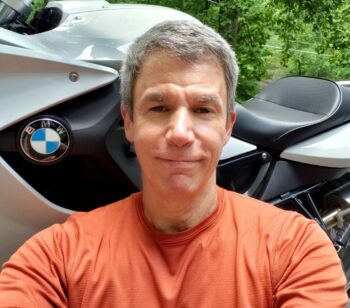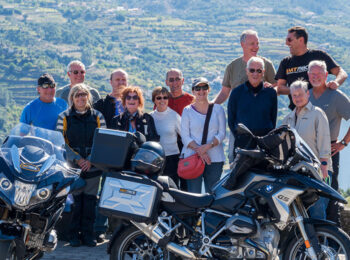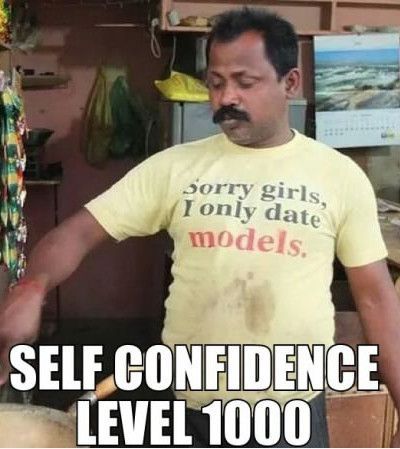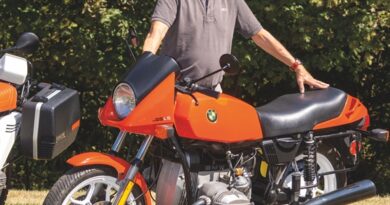Confidence Man (no – the GOOD kind!)
The term “confidence man” denotes someone who exploits others’ trust for his own personal gain at their expense. Such swindlers are skilled at manipulating others by taking advantage of their insecurity and credulity, appealing to their vanity, and winning their loyalty by telling them what they want to hear. Once hooked, the victims voluntarily surrender their money, effort, independent judgment, and other resources in transactions that actually benefit only the idealized con man, but nevertheless feel utterly compelling to those being conned. The expected grand payoffs never materialize, but seem perpetually imminent, and the cycle of promise and sacrifice can go on for a long time before the illusion is shattered, or there’s simply no more left for the grifter to extract. This is not the kind of confidence man I’m going to talk about here, but keep this traditional meaning in mind.
 I have the tremendous good fortune of being friends with an extraordinarily accomplished rider and dedicated MSF instructor named Arthur Treff. I made his acquaintance years ago when we were both writing for Motorcycle Consumer News and Art has many motorsports publications to his credit. In addition to being a highly skilled motorcyclist, pilot, and skier, he’s a very sophisticated thinker and can articulate intricately complex matters in readily understandable language. He happens to live only a couple of hours away from me in the spectacular mountains of Western North Carolina—motorcycling paradise. I was thrilled when he agreed to help tune up my skills in preparation for the spring riding season in general, and a big European tour with IMTBike in particular. I’d learned a lot from individualized instruction at BMW’s Performance Center last fall, but hadn’t been able to practice as much as I’d wanted over the winter. I feared I’d lost some of those gains from disuse, on top of the usual rustiness that sets in during the “off” season, though I live far enough south that I still get to enjoy a smattering of decent riding days while many northern riders suffer uninterrupted deprivation.
I have the tremendous good fortune of being friends with an extraordinarily accomplished rider and dedicated MSF instructor named Arthur Treff. I made his acquaintance years ago when we were both writing for Motorcycle Consumer News and Art has many motorsports publications to his credit. In addition to being a highly skilled motorcyclist, pilot, and skier, he’s a very sophisticated thinker and can articulate intricately complex matters in readily understandable language. He happens to live only a couple of hours away from me in the spectacular mountains of Western North Carolina—motorcycling paradise. I was thrilled when he agreed to help tune up my skills in preparation for the spring riding season in general, and a big European tour with IMTBike in particular. I’d learned a lot from individualized instruction at BMW’s Performance Center last fall, but hadn’t been able to practice as much as I’d wanted over the winter. I feared I’d lost some of those gains from disuse, on top of the usual rustiness that sets in during the “off” season, though I live far enough south that I still get to enjoy a smattering of decent riding days while many northern riders suffer uninterrupted deprivation.
Listen to this column as Episode 37 of The Ride Inside with Mark Barnes. Submit your questions to Mark for the podcast by emailing [email protected]. This episode will be available starting 29 August 2023.
My insecurities were compounded by multiple uncertainties regarding my upcoming tour. I’ll be with a group of complete strangers, riding an unfamiliar, big bike (a fully outfitted GS), traveling in countries I haven’t visited before, and navigating roads I expect to present novel challenges (e.g., narrower pavement and more extreme switchbacks than what we typically encounter in the US). I did not want to be the guy everyone else always has to wait for, or who keeps dropping his bike—or worse.
I imagined my tour companions as possessing far greater skill and travel savvy than I’d bring to the table, as this will be the first time in 50 years of motorcycling I’d be spending two continuous weeks exclusively on a bike. Surely the others would be vastly more experienced in such endeavors, and I’d be the lone newbie. Intellectually, I could poke holes in this fantasy: everyone has to have a first time doing anything, some in my group may be even rustier than me with their bikes in storage while I was riding, and just because someone signs up for an adventure doesn’t mean they’ve already mastered all the elements therein. Nevertheless, without some trustworthy way to gauge my own performance, I was vulnerable to much self-doubt. Even with faith my fellow tourers would be kind, supportive, and non-critical regarding my deficiencies, I wanted to be securely part of the group and not a straggler. I wanted to feel I belonged there with them, and it seemed I’d have the best chance of that if I did what I could to improve my riding.

During the winter, I’d wandered the local mountains whenever weather and my unusually tight schedule allowed and I’d done parking lot drills to reinforce low-speed basics, but these hadn’t felt adequate. I had trouble coordinating schedules with my riding buddies, and mainly had to practice alone. Self-assessment is notoriously unreliable, and although I certainly recognized areas in need of improvement, I couldn’t necessarily discern what must be done differently. What we think we’re doing and what we’re actually doing can be at considerable variance, even before we get to what we should be doing. Another set of eyes can be invaluable in getting an accurate perspective, better yet if those eyes belong to someone who a) knows proper technique, and b) can explain the needed changes in ways that generate “Aha!” experiences in the listener and build confidence instead of self-consciousness.
Confidence and self-esteem come from two primary sources. There’s the obvious one, setting out to accomplish something and succeeding. And there’s one that can be trickier, receiving positive regard from someone we regard positively; we need people we believe in to believe in us. A cheapened version of the latter often takes its place: indiscriminate praise. Simplistic pop psychology in the recent era has promoted this approach, with parents, educators, and HR departments endlessly streaming empty affirmations and struggling to avoid any trace of negative feedback for fear of discouraging their underlings. This actually tends to discredit such authorities as unable to tell the difference between good and bad performance, or it makes the recipients of this type of coddling feel either grandiosely entitled or so pathetically inept that their superiors must hunt for the faintest sign of competence to celebrate. It also leaves those in need of substantive guidance without it, since they’re deprived of a balanced assessment of what they’re doing well and what they need to improve.
When someone seems overly positive in response to what we’re doing, we can dismiss their approval as too exaggerated to take seriously. Perhaps they don’t really know any better, or they’re “just being nice.” We may even grow suspicious of them as possibly working an angle on us, like the type of confidence man described at the beginning of this essay. All these reactions are more likely when we harbor serious doubts about our abilities. Yes, we may crave reassurance we’re doing better than we thought, but we often tend to believe our own emotionally driven perspectives over incoming data from outside sources. We can also cling to a negative self-opinion for other reasons, such as fears of being seen (by others or ourselves) as conceited, or apprehension about getting our hopes up too high, only to then be more severely disappointed by any shortfalls. Better to keep our own and everyone else’s expectations low, right?

I don’t only see these dynamics in my work as a psychotherapist, I’m all too familiar with them in my own psyche. I can have real difficulty taking a compliment, with a long list of well-practiced (albeit usually unvoiced) counterarguments on tap. I’m much better about this now than in the past, but there are still a few glitches in my ability to digest praise without choking. So when I found myself taking in Art’s encouragement and reassurances at face value, I had to wonder what made them go down so easily. While the content of his instruction was certainly of great value, it was this aspect of the process that stuck out to me most. While the fact we have an established friendship undoubtedly made some contribution here, that could have just as easily been a reason to write off his support as kindness and generosity instead of an accurate reflection of my performance. Part of what makes Art a great teacher is his deep insight into not only the subject matter, but also the art of pedagogy. What was it about how he dealt with me that substantively elevated my confidence level and left me feeling more solidly optimistic about my tour?
During the three days we worked together (it’s hard to call riding motorcycles “work,” but we were purposefully focused on skill-building), he put me through a variety of drills on the MSF range where he regularly teaches, and we rode both quite easy and quite difficult country roads—including some with exactly the kind of narrow, steep, ultra-tight switchbacks I anticipate in Europe. Throughout these exercises, Art took great care to provide crystal clear directions, with a straightforward focus on a streamlined set of specific actions and tactics, keeping the verbiage to a bare minimum, but also responding to questions in whatever depth I sought. He was quick to correct my errors (“Eyes up!”), but always did so in the form of simple reminders that carried no hint of judgement; in fact, he almost always noted the universality of my problems (“We all have to practice eye work all the time.”). The implicit humility in this stance precluded any hint of one-upsmanship, which can be a contaminant in dealing with condescending, self-aggrandizing teachers who savor a sense of superiority in the instructional process; such teachers can reduce their students’ confidence to fortify their own.
The Ride Inside with Mark Barnes is brought to you by the MOA Foundation. You can join the BMW Motorcycle Owners of America quickly and easily to better take advantage of the Paul B Grant program mentioned in this episode.
When Art noted something I’d done well, or at least better than before, it typically came after I’d already demonstrated the improvement to myself. Maybe I hadn’t fully appreciated what I’d done differently, but I had an experiential reference point, a hook on which to hang his words. I’d felt a difference by following his instructions; his acknowledgement of the change captured it in language and made it available for subsequent reflection—and it was instantly, undeniably credible.
Trustful respect also played a big part. It’s not very gratifying to be well thought of by someone we look down on. Conversely, it’s quite a prize to be regarded well by someone we admire. I didn’t need any skill exhibitions to consider Art a highly competent rider; I already knew enough of his history of extensive training and accomplishments to have no doubts about his bona fides. Yet it was impressive to watch him demonstrate techniques with precision, grace, and ease. Even more impressive was the way in which he’d developed such abilities: relentless practice. Living just five minutes from the range has made regularly spending countless solo hours there convenient, with thousands of repetitions cementing good habits in place and revealing kinks that need attention. The intense dedication to life-long learning required to continually invest that much time is genuinely extraordinary and inspirational. His fascination with all the elements of riding and his capacity for patient focus have made this type of activity engrossing instead of tedious. He knows what he knows from doing it, not merely learning about it intellectually. By contrast, I can become enamored of concepts, but then fall short on collecting those experiential reference points that make “book learning” come alive, turn into muscle memory, and become much more readily actionable in real world applications.
What happened over the course of my long weekend with Art included more variables than I’ve noted here, but central to its success for me was the contribution of lived experience. It not only anchored Art’s compliments so I could take them to heart, but it also served as evidence of his teaching’s authenticity and verified his assessment of my abilities. These made him a confidence man in the best sense of that term. He inspired my confidence in both of us. What a great model for how all of us should approach the task of passing on what we’ve learned to other riders!
Mark Barnes is a clinical psychologist and motojournalist. To read more of his writings, check out his book Why We Ride: A Psychologist Explains the Motorcyclist’s Mind and the Love Affair Between Rider, Bike and Road, currently available in paperback through Amazon and other retailers.
Mark interviewed Art for Episode 27 of The Ride Inside with Mark Barnes. Submit your questions to Mark for the podcast by emailing [email protected].




